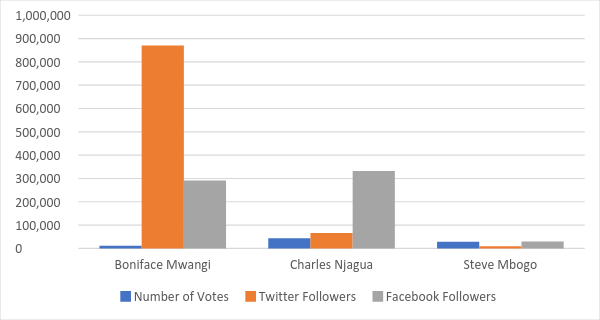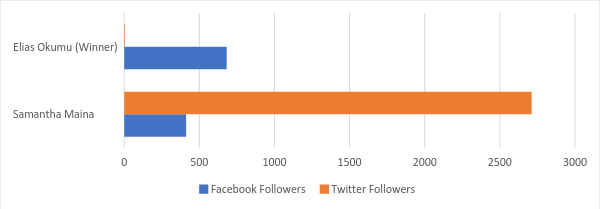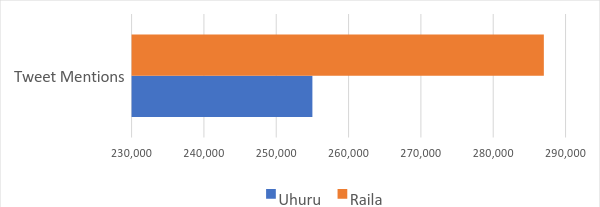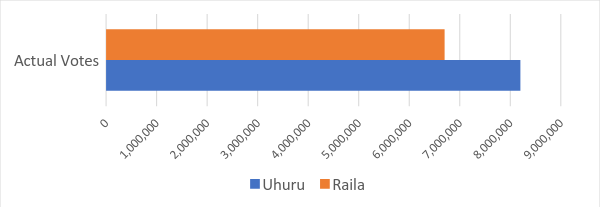The 2017 Kenyan General Election has been regarded as the Social Media Election. The mobile network providers must be smiling all the way to the bank with all the videos, GIFs and WhatsApp messages that were circulating the web space; Tweets being retweeted; Facebook posts being posted; and bloggers churning posts with their two cents and predictions on the elections. Social media has undoubtedly been a powerful tool in this election.
In this digital era of campaigns, world renowned firms like Cambridge Analytica have been employed to analyse and study the electorates and target online Ad campaigns to specific audiences. Some candidates have even run their entire campaign purely on social media, without employing the use of the traditional means of TV, radio and print advertising. This is despite trends showing that urban Kenyans are getting their news from social media platforms such as Facebook, Twitter and WhatsApp, but the majority are still heavily consuming traditional media. According to a study released by the Kenya Audience Research Foundation (KARF), the average number of Kenyans who consume daily media is 16 million, of which 94% consume TV, radio and print while only 33% consume social media. This therefore, begs the question, does social media use and popularity translate to winning votes?
Among the candidates who ran their campaigns wholly on social media, Boniface Mwangi comes to mind first. The human rights activist, defender of the people and voice for the weak ran an entirely online campaign, in a bid to be the next MP of Starehe Constituency. Among the three major candidates, Boniface Mwangi had the highest social media following and support, with 870,000 Twitter followers and 291,600 Facebook followers.

His funding was also crowd-sourced, with his campaign managing to raise funds of up to Ksh. 10,658,470 (Ukweli Party) from the wananchi through M-Pesa. However, at the polls his popularity did not convert to winning votes. Boniface Mwangi came in third place with only 11,000 votes at the point of his conceding. This, compared to the winner Charles Njagua who had 44,000 votes at the point of Mwangi’s conceding amidst a following of 65,800 on Twitter and 332,000 on Facebook and runner up Steve Mbogo, who amassed 28,164 votes at the point of Mwangi’s conceding amid a significantly lower following of 30,200 followers on Facebook and 9,800 followers on Twitter. This case study shows that online popularity does not translate to votes.
Other notable case studies highlighting zero relation between social media popularity and votes, are those of Senatorial aspirant Susan Silantoi Lengewa and Kileleshwa MCA aspirant Samantha Maina, who despite an aggressive social media campaign failed to win electorate votes. These two first time candidates hit the ground running with their campaigns, which were mainly geared towards Social media. Kileleshwa MCA aspirant Samantha Maina’s opponents did not even have much of a social media presence. However, despite her 2,700 followers on Twitter and national coverage via interviews, she came in third with only 10% of the votes.


Susan Silantoi Lengewa, the youngest ever Nairobi Senatorial candidate, amassed vast nationwide press coverage and social media support, with over 4,000 Twitter followers. However, when it came to the ballot, Silantoi only managed to garner 30,992 votes at 4th place, which accounted for only 1.96% of the votes.
The August elections also had data analysts concluding that the National Super Alliance (NASA) Presidential Aspirant, Raila Odinga would win, based on a spike of his online mentions a week prior to the elections, despite Presidential Aspirant Uhuru Kenyatta (Jubilee Party) having a larger social media following. This spike of Odinga’s mentions was prompted by the reference to the promised land of Canaan, which his supporters echoed through their tweets and posts. Despite the predictions of the social media data analysts, Uhuru Kenyatta was declared winner after the August 8th Election, beating Odinga by over 1.4 million votes. This shows that there could indeed be a relation between online popularity and votes.


So are votes actually a true representation of the aspirants online popularity
